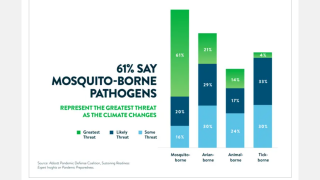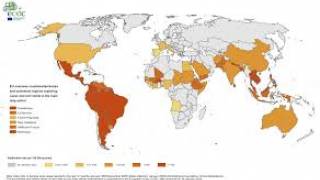Florida Fighting Zika With 2nd Generation Modified Mosquitoes

The Florida Keys are considering launching an innovative mosquito control program in Monroe County, with a focus on preventing future outbreaks of the Zika virus.
The U.S. Environmental Protection Agency (EPA) published a notice in the Federal Register on September 11, 2019, which said it had received an application to release a new type of genetically modified mosquito in the Florida Keys.
This notice announces EPA's receipt of an application from Oxitec, Ltd. requesting an experimental use permit (EUP) for the OX5034 Aedes aegypti mosquitoes expressing tetracycline Trans-Activator Variant (tTAV-OX5034) protein (identified by number 93167-EUP-E).
This EPA notice is important since the Aedes aegypti mosquitoes are the vectors known to spread the Zika virus to humans.
The 2nd Generation Friendly™ Aedes aegypti carries a self-limiting gene that prevents female offspring from surviving, allowing for male-only production.
After releases of Friendly™ males into the field, which find and mate with wild female mosquitoes, reduction of the target population is achieved as the female offspring of these encounters cannot survive.
Male progeny survives, carrying a copy of the self-limiting gene. Which in turn, these males are able to pass on the self-limiting gene to half of their offspring, of which female carriers of the gene cannot survive.
The self-limiting gene can thereby persist but declines over time, offering potentially multiple but still self-limiting generations of suppression for every Oxitec Friendly™ Aedes aegypti male released.
“Our team is very pleased with these initial trial results, as they demonstrate a self-limiting insect solution that is both highly-effective in dense urban settings and is capable of delivering features that will improve cost-effectiveness and scalability needed for larger-scale interventions,” said Grey Frandsen, CEO of Oxitec, in a June 2019 press release.
This is important news since, without a preventive vaccine or targeted therapeutics, the Zika virus could return to Florida.
Recent reports indicate the locally-acquired Zika cases are being reported in Puerto Rico, Cuba and in Mexico.
The good news is the state of Florida has only reported 33 travel-related Zika virus cases as of September 13, 2019.
However, Zika virus symptoms have been confirmed in 20 pregnant women who returned to Florida after an international trip during 2019.
Zika virus news
- Zika-Spreading Mosquitoes Reduced by 78%
- Google Eradicates 95% of Infectious Disease-Carrying Mosquitoes in Fresno
- Miami Launches ZAP Males® Mosquitoes to Fight Zika
- Genetically Killing Off Zika With Infected Mosquitoes
The EPA has determined that if this permit is granted, it may be of ‘regional and national significance.’ Therefore, the EPA is seeking comments on this application.
This notice published in the Federal Register means the opening of the 30-day public comment period, after which the EPA will review the comments as part of its evaluation of Oxitec’s project. Comments must be received on or before October 11, 2019.
The EPA says to submit your comments, identified by docket identification (ID) number EPA-HQ-OPP-2019-0274, by one of the following methods found here.
Published by Zika News
Our Trust Standards: Medical Advisory Committee

























